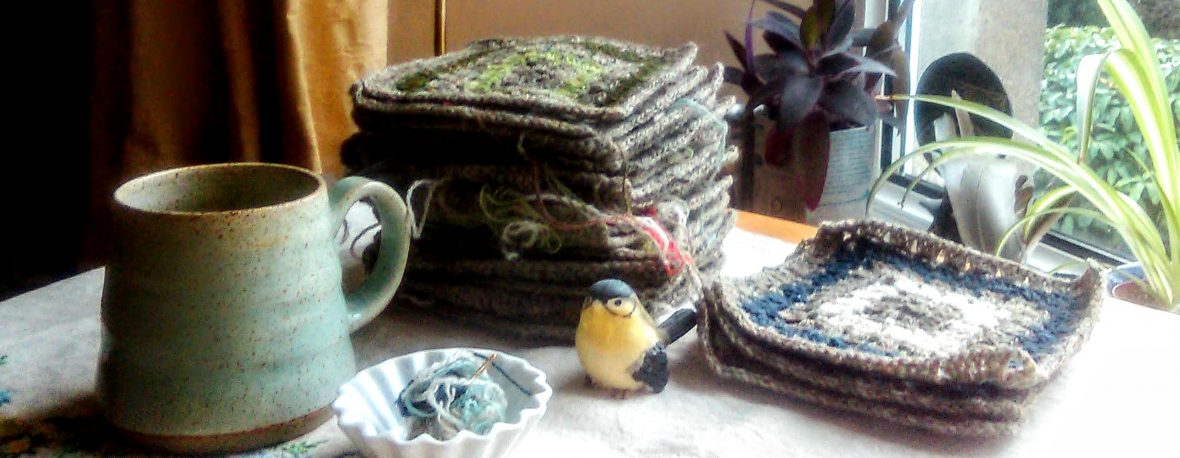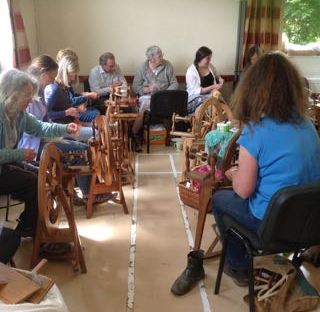Every year the wool company Wingham Wool comes to visit my local Guild. it is always very exiting, as it is a bit like wine tasting! It is trial spinning of all the fibres on offer! I was very positively surprised to find a good range of British Sheep Roving and again discovered breeds I hadn’t heard before like Massham sheep.I bought some Wensleydale fleece, which still needs carding and some Black Welsh. there is so much more to learn for me and I find this endlessly fascinating!
Tag: Campaign for Wool
Ancient Tools, Wool and Time at Archie Browns, Truro
Jamie Mills, who works at Archie Browns, a Health Food Shop, Vegetarian Cafe and Deli, asked me a while ago to show some of my recent work in the cafe.
With gratitude I accepted the kind offer and since July a show of photos and and a small installation (hand spun, plant dyed and hand knitted).
The photos are documentation of wool processes, from a visit at the Natural Fibre Company, Launceston, Bosigran Farm in Penwith, and my own processes of spinning and dying.
The exhibition is s glimpse into my art practise, where I am exploring wool as a sustainable material, natural and local resources and slow processes as a reflection and invitation to wellbeing.
The fibre, I used, came from the Natural Fibre Mills and is their carding waste.
Occasionally during in the carding processes something goes wrong, or there is a overlap between two carding lots, say Shetland and Wensleydale, (one could say its a mongrel) and the fibre can not be used for further processes.The shawl also does demonstrate my first adventure into dying with natural plant dyes, in this case onion skins, weld (yellow) and woad (blue).
Artist Statement
Wool is a living material, its connotations of clothing and keeping human mankind warm goes back to the beginning of humanity.
Wool provides the link, between our history and our presence, which I feel in my hands while engaging with a raw fleece, while quietly sitting watching how my hand spindle turns a cloud of something unformed into a form, a yarn.
The yarn becomes a symbol, it is the umbilical cord to the land, which feeds and clothes us.
The pieces, I created from this yarn become the witnesses of the time spend and an embodied holder the memory of this time: they invite reflection about our choices how we pass our time.
Wool becomes my companion in my daily enjoyment and engagement, the slow movement of a spindle, of a wooden needle grounds me, slows down time and lets my breath become slow and deep, guides me back into the presence. Wool speaks to people, brings back memories, asks to be touched, to be held and invites to use their hands and cherish the fruits of their hands, again.
Wool asks for tools and company, in such it becomes the vehicle to initiate collaborations with other artist, craftspeople and sometimes musicians.
Wool is my tool and aide to heal my own connection to the land and through my work and my invitations to others to share my vision and hope: fostering reflections towards a healed relationships with our environment, the one and only world we are living in.
What creates long term and positive Change for the planet we are living on?
What creates change?
Fear can create change on the short-term, it can modify behaviour to avoid negative consequences .
On the long-term it is the positive experience, like sincere praise and appreciation which will lead to wanting to change for the positive. It is a challenging realisation that in the end only compassion and kindness will initiate healing, starting with ourselves and then reaching out to others people, to all beings on this planet .

In our family we do buy our groceries predominantly at our local farmers market, country market and local shops. Only what we can’t buy there, we buy in a supermarket, even then we rather use the local Coop , as it is a franchise run by local people!
There is more than the rational reasoning behind it, to buy local as a means to support local economy, avoiding food miles etc. There is a very important human and emotional factor in this; over time we got to know the people behind the stalls, become more in tune with the natural seasons of our part of the world and feel more strongly part of our local community! Going shopping becomes something to look forward to rather than a chore, it’s meeting friends and sharing there joys and challenges in grow the food we cherish! Then your relationship to our food also changes, we value and enjoy it so much more, as we know we can enjoy it with a good conscious .
Sometimes I find myself in a supermarket in front say some avocados, I do like them very much, but then I realise they come from Peru or Uganda, and I leave them as there are far too much air or freight miles attached to them. I will wait for the Turkish or Spanish avocados when they are in season at the end of the summer!
A few days later I went to the Trevalyn Farm Shop on the Helston Road, and there were, my Spanish avocados, small and ripe!
It also reminds me, that we’d live in an age of instant gratification. Waiting for a seasonal crop to come around , learning to enjoy what is locally available, requires a shift in thinking and feeling!
Whats that got to do with Wool and Making?
The same principle applies, using local or at least British Wool, reduces the environmental cost on extensive product travel and supports the local economy . The moment we start to make something ourselves, we learn patience and perseverance again. If we combine local material and hand making we create a stronger bond not only to what we make, but also to our community and the place where we live.
Excerpt from the Campaign for Wool Website
The Campaign for Wool was initiated by His Royal Highness The Prince of Wales and launched in 2010 in the UK. It is supported by sheep farmers, manufacturers, retailers, consumers and wool lovers across the globe. Its simple agenda is to encourage greater understanding and use of real wool and its many natural and sustainable assets. In five years it has spread from the UK to fifteen countries internationally, has attracted millions of social media followers and in 2014 achieved media coverage valued at nearly $ 50 million. Funded by the leading wool grower organisations of the world, the Campaign for Wool has a long-term agenda to maintain a high-profile for wool as the superior natural fibre and works in partnership with wool industry partners globally. – See more at: http://www.campaignforwool.com/news-item/surfaces-2015/#sthash.
Working with local and British wool has changed my perception of clothing in a very deep and profound way. My awareness about the environmental impact of production of actually everything we consume has become a constant companion in my thinking. I am aware of my choices and where I can make decision with a lesser impact, I can choose to support producers by buying local and fair trade and organic as much as I can. It sometimes means waiting, for the right time, for the right item to be available to me.
I spin and knit, daily, meditating, learning to be with the process , learning to be with the time it takes.



























